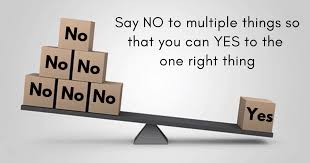

Do you ever come across a situation where your brain says YES but your heart desires to declare NO?
Have you ever felt that refusing to assist someone might exemplify you in the bad light?
Do you constantly hope to be able to deny?

The circumstance where we are not comfortable to say yes but we agree, does not provide any joy to us. For our own sake, we ought to practice the art of declining.
Let us discuss why it is essential to learn this vital skill.
· Saying no is an indication of courage.
· It is a symbol of self-confidence.
· It is important to say no in relationships to have healthy boundaries set.
· It demonstrates your frankness and gives clear idea to the other person what to expect from you in the future.
Saying NO will be awkward to begin. So it must start by turning down modest offers without feeling any shame or guilt. For instance, you can initiate by refusing to accept a drink at a gathering, or sharing your notes with a fellow classmate. It will give you an idea about the true side of your relations. It will notify whether people are fond of you or merely call for your assistance. Do they respect your repudiation or consider it an insult.

Always refuse firmly yet politely. Remember you are saying NO to the offer and not to the individual.
You cannot pour from an empty vessel; therefore you need to make yourself a priority. It is the central aspect of self love (we will cover the chapter on it later)
What should you believe while saying no -
· Don’t feel at fault. It is not immoral to disagree with.
· You don’t have to execute whatsoever asked, just to make somebody's day. Stop being a people’s pleaser.
· A negative response does not mean you are self-centered. It is absolutely fine to review your feelings. It does not reflect your bad image.
· It does not make you less compassionate. If you decline an offer or request, that does not signify you don’t care for them. It simply means you don’t wish to be a part of that particular occurrence.
If your mind and spirit are in conflict concerning a particular offer and you are puzzled whether to consent or differ, you must take into account the following:
· If saying no to an opportunity grants additional time for something else, you can be your highest priority. For example, if not accepting an invitation to a gathering awards the time to conclude that book, watch a movie or simply indulge in your hobby; it is perfectly fine to do so.

· Listen to your body. If you feel exhausted and require break over the weekend or your heart is not enthusiastic about that incident, you don’t have to accept it.
· Ask yourself - if fulfilling that demand provides any delight or benefit to you. If attending a function makes you feel miserable, or you don’t wish to meet some specific people, you have complete authority to deny.
· You may also consider the help you obtain from the same people. You will get an idea if they are taking an advantage of your innocence.
Saying NO must not sound rude and offensive to the asker. Let us be aware of the modus operandi:
· Do so considerately and confidently.
· If it is an official disagreement, do so professionally.
· Take a moment before responding.
· Don’t apologize after rejecting.
· Don’t give justification or explanation.

Refusal should be in a manner that it does not hurt the sentiments of others. Few suggestions to graciously say NO are provided here:
· I am honored but I can’t do it/ be there.
· Unfortunately, it isn’t a good time/day for me.
· Sorry but I am occupied.
· Sounds great, but next time.
· I am not ready for it right now.
· Thank you for thinking of me, but I can’t.
· My plate is too full.
It is essential to recognize the difference between self love and being egotistic. Refusing occasionally for your peace of mind is acceptable, although if it is a tendency to be unavailable to others when they need, it is also not correct. Make sure your reaction to proposals does not spoil your reputation and relationships


















